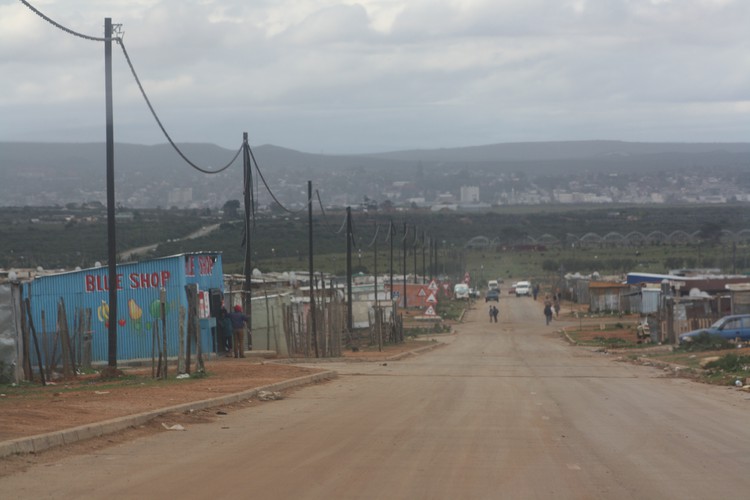Nelson Mandela Bay says it will not provide services to new land occupations
The municipality is in the process of “formalising” 156 informal settlements by providing services like water, electricity and tarring roads
The Nelson Mandela Bay Municipality is installing electricity in Area 11 in Gunguluza, Kariega as part of its plan to formalise 156 informal settlements in the metro. Photo: Thamsanqa Mbovane
- Nelson Mandela Bay municipality is busy with what it calls “formalising” 156 informal settlements across the metro.
- This includes providing these communities with essential basic services like tarring roads, installing infrastructure for water and toilets and electricity.
- The municipality has said that no new occupations established from May 2021 will be recognised by the council. This is despite the steep growth in population size.
“Our people relieve themselves in plastic bags and throw it in the bush across from our shacks. When it’s hot, we breathe in stinking human waste,” says Hugh-Reece Williams from Doornhoek informal settlement in Ward 48.
He was among 30 community leaders who met in Kariega to discuss the municipality’s undertaking to formalise 156 informal settlements across Nelson Mandela Bay. The workshop was hosted by the International Budget Partnership (IBP) of South Africa in partnership with the municipality.
Thembakazi Hlela, a senior municipal official responsible for informal settlements in the metro, said that no new land occupations would be recognised once the 156 informal settlements have been formalised. This is in line with a council resolution taken on 30 April 2021, which was implemented immediately.
Hlela said 101 informal settlements were in various stages of the formalisation process which included installing electricity, water, roads and other infrastructure.
Recent statistics on how many people live in shacks — or informal dwellings — in the Eastern Cape, or South Africa for that matter, are hard to find. Stats SA’s General Household Survey of 2017 found:
“Slightly over four-fifths (80.1%) of South African households lived in formal dwellings in 2017, followed by 13.6% in informal dwellings, and 5.5% in traditional dwellings. The highest percentage of households that lived in formal dwellings was observed in Limpopo at 91.7%, while the lowest was the Eastern Cape at 70.4%. Approximately one-fifth of households lived in informal dwellings in North West (19.9%) and Gauteng (19.8%).”
The survey also found: “13.6% of South African households were living in RDP or state-subsidised dwellings. Some residents raised concerns about the quality of subsidised houses, and 10.2% said that the walls were weak or very weak while 9.9% regarded the roofs of their dwellings as weak or very weak.”
During the workshop, Williams explained that when their community occupied the land in 2019, they had no toilets, electricity or water on the land for a year. The occupiers then protested last year and the municipal workers installed a standpipe for water, but they still need toilets. He said several families were moved to Doornhoek by municipal officials and those shacks were electrified but not homes belonging to nine other families living on the land.
Hlela confirmed that Doornhoek is one of the 156 sites that will receive services.
Khayalethu Kate from Area 11 in Gunguluza said that the neighbourhood of Phase One has been without water for two weeks. Kate and other occupiers relocated from Ward 47 to Area 11 a few years ago.
Hlela said water tankers will be sent to Area 11.
The IBP is working with organisations in Nelson Mandela Bay to collect data on access to water, refuse and street lights.
Support independent journalism
Donate using Payfast

Next: Covid-19: Is it time to allow home-testing?
Previous: Hundreds march to Union Buildings over health system corruption
© 2021 GroundUp. This article is licensed under a Creative Commons Attribution-NoDerivatives 4.0 International License.
You may republish this article, so long as you credit the authors and GroundUp, and do not change the text. Please include a link back to the original article.
We put an invisible pixel in the article so that we can count traffic to republishers. All analytics tools are solely on our servers. We do not give our logs to any third party. Logs are deleted after two weeks. We do not use any IP address identifying information except to count regional traffic. We are solely interested in counting hits, not tracking users. If you republish, please do not delete the invisible pixel.

